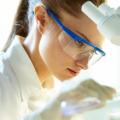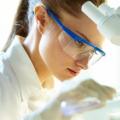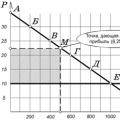Biochemistry who can work. Biochemist profession. Who is a biochemist. Biochemists in Science and Education
A biochemist is who, what are the requirements for it and what a specialist should be able to do.
Features of the specialty
The term itself appeared in the 19th century and only thanks to the scientist from Germany Karl Neuberg it firmly entered the number of scientific ones.
The scientific discipline includes chemistry and biology, while investigating the reaction of various substances, as well as chemical reactions occurring in a human cell, or. It is thanks to biochemistry that methods have been developed that make it possible to separate various heterogeneous masses and particles using a centrifuge.
Chromatography can be used to study molecular or cellular biology in more detail. These and many other technologies will make it possible to obtain greater results in the study of biological species and processes in the body.
What do they do?
Biochemists are required to have knowledge of various biological sciences. They can conduct research on issues in theoretical as well as applied biology, etc.
(function (w, d, n, s, t) (w [n] = w [n] ||; w [n] .push (function () (Ya.Context.AdvManager.render ((blockId: "RA -329917-21 ", renderTo:" yandex_rtb_R-A-329917-21 ", async: true));)); t = d.getElementsByTagName (" script "); s = d.createElement (" script "); s .type = "text / javascript"; s.src = "//an.yandex.ru/system/context.js"; s.async = true; t.parentNode.insertBefore (s, t);)) (this , this.document, "yandexContextAsyncCallbacks");
The results of research carried out by scientists are applied in such areas as industrial biology, vitaminology and in certain areas of genetics.
Experiments in biochemistry are used in various institutions related to education, enterprises specializing in production related to biochemistry, agriculture.
Biochemists work not only in laboratories, but also directly in production, using special equipment and sophisticated instruments.
What should be able to do
The biochemist is obliged to:

- be able to conduct a variety of scientific research;
- analyze the results and draw conclusions;
- perform certain technological operations in various types of industries;
- to carry out certain types of work on taking and studying the blood of people or animals;
- know and follow the technological regulations of the working biochemical process;
- control the reactions of reagents;
- control raw materials;
- study the chemical composition of materials and the properties of finished products.
Requirements for personal characteristics
In order to become a professional biochemist, you will need to have the following personal characteristics:
- to be attentive;
- have an analytical mindset;
- have a good memory;
- be ready for long and painstaking work;
- have perseverance;
- great patience;
- observation will be required;
- you need to know and follow all applicable safety rules and be very careful.
Good communication skills and personal responsibility for the undertaken obligations will not interfere with working in a team of a laboratory or an enterprise. Specialists are in great demand in the labor market and therefore their salaries will be very good.
Now you know the basics of the profession of a biochemist who is who, as well as what opportunities open up for those who have chosen it.
(function (w, d, n, s, t) (w [n] = w [n] ||; w [n] .push (function () (Ya.Context.AdvManager.render ((blockId: "RA -329917-3 ", renderTo:" yandex_rtb_R-A-329917-3 ", async: true));)); t = d.getElementsByTagName (" script "); s = d.createElement (" script "); s .type = "text / javascript"; s.src = "//an.yandex.ru/system/context.js"; s.async = true; t.parentNode.insertBefore (s, t);)) (this , this.document, "yandexContextAsyncCallbacks");
What is the essence of the profession Biochemist
Biochemists investigate chemical and physicochemical processes at the molecular level in scientific research. In addition, they may be involved in biochemical manufacturing, product development, quality assurance, or consulting.
Biochemists in Science and Education
Biochemists study the structure of cells and the processes in the cell, study the transfer of information through proteins, or study the types of cells and antibodies that make up the immune system. In the fields of biotechnology and genetic engineering, they are working to make substances of pharmacological or economic interest commercially available through targeted mutations in bacteria and yeast. In the biochemistry of natural products, they deal with structural analysis, biosynthesis and biodegradation of, for example, antibiotics. In the field of bionics, they explore structural and organizational principles from nature and use their knowledge to develop bionic materials such as self-cleaning surfaces. In clinical biochemistry, they investigate genetic or ecological metabolic diseases, investigate the behavior of drugs in the body, or investigate the effects of civilization products such as pesticides on microorganisms, plants, animals and humans, and derive marginal values from it.
Biochemists publish research results and make them available to other scientists and students. At conferences and congresses, they talk about their scientific findings. They give lectures and seminars, supervise scientific work and take exams.
For independent research activities, a master's degree and a doctorate are required.
Biochemists in production and sales
Biochemists working in the field of chemical, pharmaceutical or biotechnology technologies transfer research results to large-scale production. In this so-called scaling-up, they look for technically feasible, economical and environmentally friendly production routes for new products and test the results of the development laboratory under practical conditions. Biochemists design and optimize processes, plan production processes, analyze and optimize processes, and guide employees. They ensure product quality through the accompanying control of input materials as well as intermediate and final products. They are applying for approval or licensing of manufacturing in accordance with the applicable regulations for new drugs.
In performing inspection tasks, they ensure that manufacturing facilities, equipment, analytical methods and all steps in the production of sensitive products such as pharmaceuticals always meet the required high quality standards. In sales, biochemists advise doctors or research institutes on new drugs or laboratory equipment or diagnostics, negotiate sales, enter into contracts, or develop product management concepts.
Management positions often require biochemists to hold a master's degree.
The main place of work of graduates is research and medical laboratories. All medical institutions need biochemical research. Also, these specialists are needed in companies involved in the development of new vaccines and drugs.
Spheres of application of knowledge:
- immunology and virology;
- genetics;
- Forensic-medical examination.
Specialists in immunology and genetics are especially in demand. A large number of pathogens and their constant mutation require operational study and development of methods to combat them. Knowledge of genetics allows you to predict the likelihood of pathologies and reduce their risk.
If a graduate is attracted by pedagogical activity, he can additionally master the pedagogical program and teach at school or secondary specialized educational institutions.
Perspectives
The starting position after graduation is laboratory staff member or associate researcher. For further growth, it is necessary to complete a master's degree training. This will provide an opportunity not only to improve qualifications, but also to occupy administrative and managerial positions. In addition to research work, biochemists can engage in consulting and educational activities. This can be the initial admission and prescription of treatment or specialized advice on the correct use of medications. Postgraduate studies will allow you to deeply engage in scientific activities.
The profession of a biochemist opens up wide opportunities for self-realization and career growth. Modern medicine, chemistry and biology are developing at a stunning pace - in all these areas a biochemist can find application for his knowledge.
The work of a biochemist is based on the study of chemical processes that take place in the cells of living organisms. That is why research results are so important for drug manufacturers and for physicians in general.
Specialists in the field of biochemistry study a wide range of issues that closely intersect with related disciplines, such as: molecular biology, vitology, genetics, enzymology, organic and biological chemistry.
Labor market research has shown that employers in the Moscow region are ready to offer the highest salaries:
Description of the profession biochemist
The profession of a biochemist presupposes a deep knowledge of microbiology, botany and physiology. Specialists can work not only in research laboratories, but also in pharmacological enterprises, in agriculture. The biochemist monitors the quality of the finished product, its composition and compliance with standards.
In the past few years, there has been an upsurge in the domestic scientific community. Thanks to close cooperation with Western institutions, the demand for competent scientists remains consistently high. Russian research institutes exchange experience with foreign colleagues, send employees for internships, and are engaged in advanced training. A competent biochemist will be able to realize himself without problems in both theoretical and applied fields of activity.
Do not miss:
You can master the profession of a biochemist in the following universities:
- Siberian State Medical University;
- Moscow State University M.V. Lomonosov;
- Moscow State Academy of Veterinary Medicine and Biotechnology. K.I. Scriabin.
The lion's share of the biochemist's working time is spent in the laboratory. The specialist must have an analytical mindset, be attentive and observant. In addition, a biochemist must understand computer technologies, without which it is impossible to imagine modern research.
 05 01 medical biochemistry where to work
05 01 medical biochemistry where to work Biochemistry who can work
Biochemistry who can work Types of monopolies: natural, artificial, open, closed
Types of monopolies: natural, artificial, open, closed